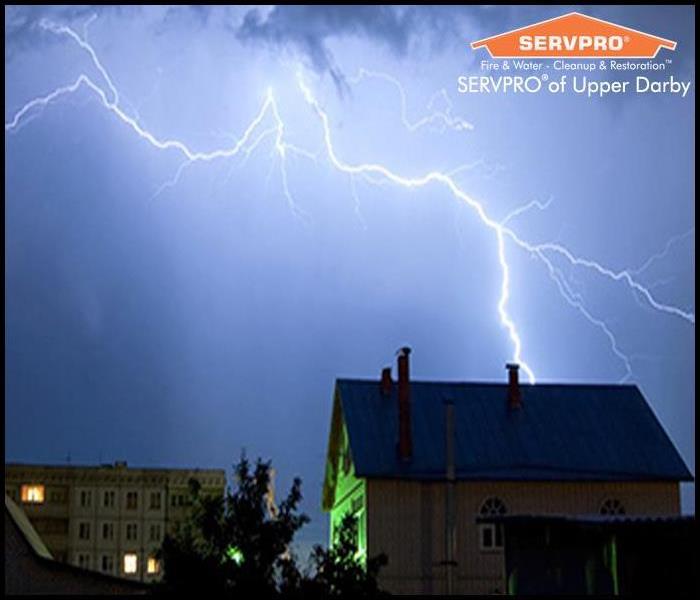What Happens If Lightning Strikes Your Home?
8/7/2018 (Permalink)
 Our highly trained professionals use specialized equipment and advanced training to quickly restore your Wayne property to pre-storm condition.
Our highly trained professionals use specialized equipment and advanced training to quickly restore your Wayne property to pre-storm condition.
A cloud-to-ground lightning bolt's main objective is to find the path of least resistance from the cloud to deep into the ground. Your house is filled with many potential routes for lightning to follow. This includes gutters, downspouts, metal window frames, water and gas pipes, electric lines, phone lines, cable TV/internet lines—anything conductive in your house. Lightning doesn't need conductive objects to reach ground, but conductive objects make lightning’s journey even more convenient.
Lightning passing through your home will often “branch” and use more than one path to ground at a time. It can also jump through the air from one conductive path to another in what is called a side flash. For example, lightning may first connect to electric lines in the attic of a house, then jump to better-grounded water pipes on a lower floor. Bolts have been seen jumping from wall outlets to sink faucets and even across rooms!
Three Major Hazards to Homes Hit Directly
Fire Danger
The biggest danger lightning poses to a house is fire. Wood and other flammable building materials can easily be ignited anywhere an exposed lightning channel comes in contact with (or passes through) them. It is most common for lightning to start a fire in the attic or roof of a house, as the channel usually has to pass through some of the roof’s structural material before it can reach a more conductive path such as wiring or pipes. When lightning current travels through wires, it will commonly burn them up—presenting a fire ignition hazard anywhere along the affected circuits.
Power Surge Damage
If lightning chooses any of the home's electrical wiring as its primary or secondary path, the explosive surge can damage even non-electronic appliances that are connected. Even if most of the lightning current takes other paths to ground, the home's electrical system will experience enough of a surge to cause potentially significant damage to anything connected to it, electronics in particular.
Shock Wave Damage
Another major source of damage from lightning is produced from the explosive shock wave. The shock waves that lightning creates is what produces the thunder that we hear, and at close range, these waves can be destructive. Lightning can easily fracture concrete, brick, cinderblock, and stone. Brick and stone chimneys can be damaged severely by lightning. Lightning's shock waves can blow out plaster walls, shatter glass, create trenches in soil, and crack foundations. Shrapnel is a common secondary damage effect, with objects sometimes found embedded in walls!
What to Do If Lightning Strikes Your House
If you know your house has been struck, call the fire department immediately. Ignited materials in the roof or walls may start with a slow burn before turning into a full house fire. A lightning fire is particularly dangerous for this reason, and you should always take steps to ensure the safety of your home and family.
- Call your local fire department or 911 if you smell smoke. If a fire starts in the attic, you may not notice right away. The fire department can perform an inspection and search for issues.
- Find an electrician to assess your wiring and make sure there are no damaged wires that may cause a fire hazard later.
- Inspect your roofing and siding for damage from the strike itself.
- Call SERVPRO of Upper Darby for your emergency board-up and/or fire and water restoration needs
How to Stay Safe in Your Home
While rare, it is possible to receive a lightning injury inside a house. Burns and electric shock injuries can occur when someone is in direct contact with one of lightning's chosen paths to the ground. The most common indoor lightning injuries involve a person talking on a corded phone or resting on/looking out of a metal-framed window. "Side flashes" (discussed above) that jump across rooms can also cause injuries. Again, they are rare.
Things to Avoid
- Taking a shower or bath
- Doing dishes
- Using electronics (computers, video games, or wired phone, tools or appliances)
- Metal-framed windows
- Direct skin contact with earth ground. This is because lightning current can travel through soil and across wet/damp concrete. Wear shoes if walking in a basement, garage, or patio.
Highly Trained Restoration Specialists
When a lightning strike causes a fire, it can be frightening. At SERVPRO of Upper Darby, we recognize that these events are daunting, and you may not know where to turn next. Our highly trained technicians are prepared to handle fire damage of any kind, so you can feel at peace when you put your trust in us.
There is no substitute for training and experience. As fire and water damage specialists, our business is built upon fire and water restoration expertise. We have the knowledge and specialized equipment to get your property back to pre-fire condition.
Call SERVPRO of Upper Darby, PA at (610) 352-0700 for all your cleaning, water damage, fire damage and mold remediation needs!






 24/7 Emergency Service
24/7 Emergency Service